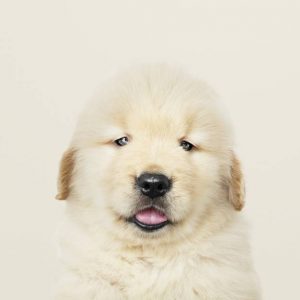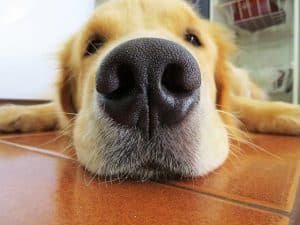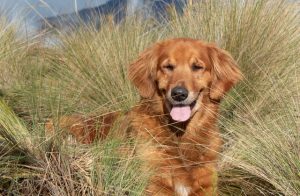We all love puppies! They are adorable, they play, they sleep, they eat, they chew on things including you! A lot of people want to immediately teach their puppy not to bite them. But this is not always the best plan. A better plan is to teach a puppy bite-inhibition.
What Is Bite-Inhibition?
Bite-inhibition is when we teach a dog to bite softer and softer vs. not bite at all. Why would we want to do this? Well, a dog may, at some point in its life, feel threatened and feel the need to bite. A dog in this situation who has trained not to bite at all will bite as hard as he can, not knowing the damage that he is doing. If, on the other hand, the dog has been trained with bite-inhibition he will bite much softer in the same situation.
If you train a dog to not bite at all he has no idea how hard or how damaging his bite is. He doesn’t really have jaw control, biting down is just biting down. With bite-inhibition, you are teaching your dog how hard is too hard to bite, making him more aware of his jaw power. This way you can teach your pup that even the lightest of tooth to skin contact hurts humans.
You see a dog doesn’t really want to hurt people. Even if he feels the need to bite, it is typically more of a warning then an outright attack. If a dog doesn’t know how powerful his jaws are because he has had no bite-inhibition training he will bite hard. It will seem like he meant to do damage even if he just meant his bite as a warning.
Think your dog will never encounter a situation in which he feels threatened and feels he needs to send a warning bite? Accidents happen. You step on your dog’s tail or paw while he is sleeping, your child trips and falls on your dog, your grandma’s cane falls over and hits your dog, you accidentally shut your dog’s tail in a door. All of these situations could make your dog feel threatened and want to bite.
You might be thinking “okay well, I don’t mind if I accidentally do something and my pup bites me.” But those puppy jaws will turn into powerful adult jaws at some point. These adult jaws will be able to do major damage. And it’s not just you that could be in danger. Your child, your grandparents, someone else’s child, the vet, the groomer, your spouse. Any of these people could accidentally elicit a bite from your dog.
Think about it for a second, if your dog bites someone else’s child. Perhaps, the kid jumped off the couch and landed on your dog’s tail. Would the child’s parent be cool with it, if when your dog bite he drew blood? Probably not. Indeed, your dog would likely be seen as a monster that should be put down!
A dog should be able to express a warning to let people know that he feels threatened. But it is unacceptable for him to draw blood on any human. So, what is the solution? Bite-inhibition.
How To Train Bite-Inhibition
Allow your pup to chomp on you. When he bites down and it hurts “yelp!” and walk away, don’t give him any attention. You want to “yelp” like a puppy, this is what your pups littermates would do if he played too rough with them. Yelping lets your puppy know that he hurt you, which he did not mean to do. Then when you walk away, that teaches your pup that if he plays too rough the game is over.
After a few minutes go back and let your pup chew on you some more. Again “yelp” if it hurts when he bites you and walk away. Pretty soon your pup will not bite you to the point of hurting you.
Once you reach that point, you will start to “yelp” and walk away for bites that are just on the edge of hurting you. Continue in this way until your pup no longer bites you that hard. Then “yelp” and walk away for softer bites. At this point, your pup will be thinking “man these humans have no pain threshold!”
You will continue to work in this way until you only allow your pup’s teeth to barley touch your skin. If he applies any pressure you “yelp” and walk away. Then if anything happens later in life and your dog feels threatened he will bite so softly that he should leave no mark at all. Yet, he will get his point across. Win, win!
Some puppies naturally have soft mouths. A lot of retrievers and spaniels are this way. Even if your pup has a very soft mouth it is still important to teach them bite-inhibition. Some puppies will have such soft mouths that they won’t even be interested in chewing on you. With these pups, you will need to do a little work to get your pup to actually chew on you. But it will be well worth it.
Summary
It is important to train your dog bite-inhibition and not just to not bite people. Overall, it is a good plan to teach your pup how powerful his jaws. This will help him to not bite so hard if he ever feels he needs to bite in the future, when he has stronger, adult jaws. So, be sure to train your pup bite-inhibition!






Leave a Reply
You must be logged in to post a comment.